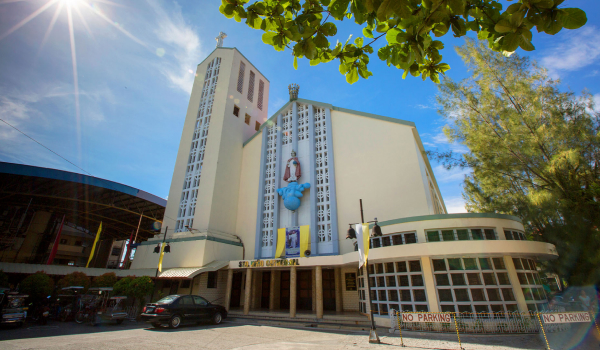
In a land area of 4,364.72 square kilometers, the diocesan territory covers the civil Province of Oriental Mindoro.
Oriental Mindoro is a province of the Philippines located in the island of Mindoro under MIMAROPA region in Luzon, about 140 km southwest of Manila. The province is bordered by the Verde Island Passage and the rest of Batangas to the north, by Marinduque, Maestro del Ocampo Island, Tablas Strait and the rest of Romblon to the east, by Semirara and the rest of Caluya Islands, Antique to the south, and by Occidental Mindoro to the west. Calapan City, the only city in the island, is the provincial capital. The city is a 3rd class city in the province.
In 2017, the total population of Calapan Apostolic Vicariate is 921,740 of which 92.80 percent are Catholics or equivalent to 855,580.
Suffragan of Lipa
Created Apostolic Prelature: July 2, 1936
Elevated to Apostolic Vicariate: July 12, 1951
Comprises the civil Province of Oriental Mindoro
Titular: Sto. Niño (child Jesus)
First founded by Spanish Agustinian Recollect, Father Diego de la Madre de Dios in 1679, Calapan started as a parish church with built settlements around it later on becoming a small town. These settlements were built near the seashore along Calapan River. The development of the town of Calapan was thus similar to the pattern of town development during the Spanish colonial era where the establishment of residences, town hall and plaza were built around the church under the watchful eyes of the Spanish priests. With the gradual development of Calapan, eventually became the seat of administrative power and the capital of the whole province of Mindoro during the last stages of the Spanish period.
On July 2, 1936 Apostolic Prelature of Calapan was created and Most Rev. William Finneman, SVD, DD was elected first Apostolic Prefect. On June 21, 1946, Most Rev. Enrique (Henry) Ederle, S.V.D. was appointed second apostolic prefect.
The prelature was elevated to apostolic vicariate on July 12, 1951 with Most. Rev. Wilhelm Josef Duschak, S.V.D. appointed first apostolic vicar and on Nov. 26, 1973 Most Rev. Simeon O. Valerio, S.V.D. appointed second apostolic vicar.
On April 28, 1989, then Msgr. Warlito Cajandig was appointed third apostolic vicar. Most Rev. Cajandig is the first diocesan bishop of Calapan whose main thrust is BEC.
History of Calapan City
The name Mindoro was coined from the Spanish term "Mina de Oro" which means "gold mine". This was how Spanish navigators, led by Juan de Salcedo, described the island after they found buried Chinese cargoes with gold threads, jars, silverware and porcelain.
Calapan was formerly a small village before the establishment of the first Religious District in Baco. The District convent was transferred to Calapan in 1733 and began its jurisdiction over the Northern Mindoro Ecclesiastical Area.
In the early 18th century, the town occupied only a strip of land stretching from Ibaba to Ilaya in a cross - formed facing the present church and cut-off by a river. In the course of the century, succeeding barrios were founded.
In 1919, the boundary dispute between Calapan and Naujan was adjudicated by Presidentes Agustin Quijano of Calapan and Agustin Garong of Naujan over a portion of the territory of what is now known as the present boundary. The portion of agricultural area was awarded to Naujan, thus, making the area of Calapan much smaller as compared to that of Naujan which is now considered as the biggest municipality of the province.
At present, Calapan has an area of only 250.06 square kilometers (according to LMB). It has also jurisdiction over the three (3) Baco Islets on the Calapan Bay and the two (2) Silonay Islets.
The derivation of the name of Calapan cannot be traced with certainty. Some opined that it came from the word "Kalap" which means to gather logs. Thus "Kalapan" was supposed to be a place where logs were gathered. In the old records, however, there was never a mention of Calapan as a place where logs were produced or exported. Furthermore, huge forest trees where logs were produced certainly did not grow near the town, which was swampy. Another theory holds that Calapan was originally pronounced as "Kalapang" which, according to an old Tagalog dictionary, was a synonym for "sanga" or branch. It could then refer to the settlement of Kalapang as a branch of its mother town of Baco, an adjoining town. The name was later hispanized as Calapan.
The year 1998 was a landmark event for Calapan when it was converted from a municipality into a component city by virtue of Republic Act No. 8475. The law was authored in Congress by Rep. Renato V. Leviste, signed by President Fidel V. Ramos on Feb. 2, 1998. On March 21, 1998, the people of Calapan ratified the creation of the City of Calapan in a plebiscite marking the same day as the city's foundation day. Incumbent Mayor Arnan C. Panaligan became the last Municipal Mayor and the First City Mayor of the City of Calapan.
Since its creation as a city, Calapan has witnessed significant strides in commerce and industry, infrastructure and social services. New commercial establishments were opened providing employment and income opportunities for the residents. An expanded program on social services delivery, particularly in health care and education, were undertaken. An upgrade of the city's physical structures includes the construction of new roads and drainage facilities and a new City Government Center.